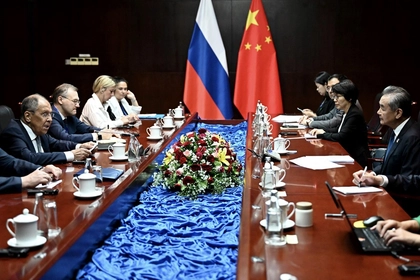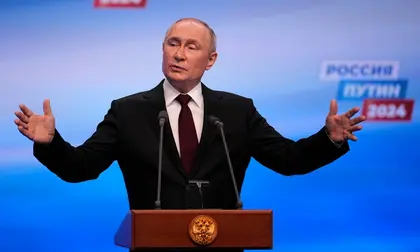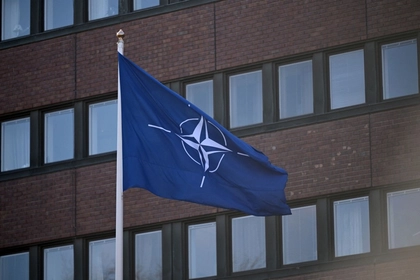The presidential elections in Russia have ended with the expected result: Vladimir Putin has been confirmed as the country's leader until 2030 - having secured almost 88 percent of the vote, according to the country's Central Election Commission. Observers reported well over 1,000 cases of irregularities, and opposition candidates were not allowed to stand. Europe's press discusses what the vote means.
Putin beats Putin
JOIN US ON TELEGRAM
Follow our coverage of the war on the @Kyivpost_official.
Webcafé columnist Dragomir Simeonov scoffs:
“I heard there were elections in Russia. I'd completely forgotten that they have a democracy there at all. Oddly enough, the Russians still haven't given up faking them yet. And once again the choice was: Putin or Putin! I wish they'd put the real names of his doubles on the ballot slips so people wouldn't get confused. Anyway, nobody cares about the final result because it's been decided long in advance.”
Next step could be general mobilisation
Putin will use the result to step up the war against Ukraine, Jurnalul National is convinced:
“With a massive turnout and a landslide victory, Putin wanted to demonstrate that he has overwhelming support for the invasion of the neighbouring country. This means the final tally could give the Kremlin leader a major boost for the war in Ukraine. He can now order a general mobilisation in Russia, with additional troops being sent to the front. As US military aid for Kyiv continues to be blocked in Congress and European commitments are delayed, this would put enormous pressure on Ukraine's defences and shift the balance in this confrontation in Moscow's favour.”

Russia, China FMs Meet as ASEAN Talks Get Underway in Laos
Only his defeat can bring renewal
El Mundo views Putin's current strength with concern:
“The elections served to politically entrench a war in which time is playing in the Kremlin's favour. Putin trusts that the Western allies will be worn down, as the recent confrontation between Macron and Scholz has shown. ... Putin has never been stronger in the past two years. ... This scenario obliges Europe to do everything it can to defend Kyiv against a Russia that has become an existential threat and could in the future absorb former Soviet republics that are now European, such as Estonia, Latvia and Lithuania. ... Putin's defeat is also the only possible path to a transition to democracy, the lifting of sanctions and Russia's reintegration into the international community.”
Queues as a sign of change
La Stampa sees an omen:
“Queues are back in Russia. The disappearance of the famous phenomenon typical of Soviet socialism was seen as a great victory - a measure of the new post-communist nation's success, at least economically. ... But the weeks leading up to Putin's so-called election were again characterised by long queues. First the queues of supporters for Boris Nadezhdin. ... Then the kilometre-long queues of people paying their last respects at Alexei Navalny's grave. Yesterday Russian voters abroad waited for hours outside embassies. And queues formed outside many polling stations in major Russian cities at around 12 noon, the hour chosen by Putin's critics to show that they still exist.”
Opposition in exile is irrelevant
Ukrainska Pravda complains:
“The main characteristic of the Russian opposition is that it is not an opposition. This status is naturally inseparable from the struggle for power, but hardly anyone seriously sees those who have left the country as the bearers of Russia's future. As long as the power vertical in Russia resembles a mast crackling with tension, the only role left to the Russian opposition is that of dissidents. In other words, of those who merely defend their right to stand on the sidelines while the others march on the parade ground. ... The Russian emigrants have no influence on events in the country. ... Before the war, their main agenda was to fight corruption - and even back then that was not Russia's biggest problem.”
The Russians chose their ruler
A change of government in Russia cannot be brought about from outside the country, Savon Sanomat stresses:
“It's important to remember that the Russians themselves chose their future ruler when they turned against Boris Yeltsin, who had promoted civil liberties and democracy in the 1990s. The situation came to a head in 1998 with the economic crisis. The people wanted order, and that's what they got. The Russian power apparatus cannot be changed by anyone but the Russians themselves. The spectacle last summer when Yevgeny Prigozhin challenged the war in Ukraine showed that anything can happen in a very short space of time.”
You can also highlight the text and press Ctrl + Enter






